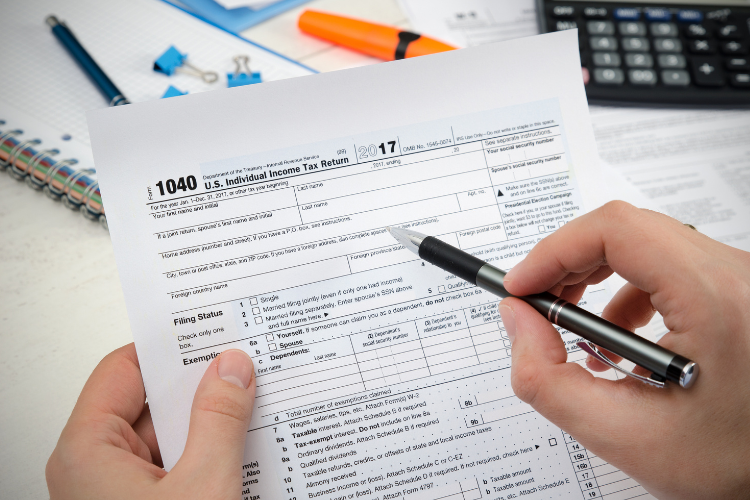Last Updated on June 19, 2025 by Maryam Siddiqui
Moving to Portugal can be an enriching and exciting experience. You’re surrounded by a change of environment – new laws, new culture, new everything! This can include the very confusing concept of personal tax deductions in Portugal. Among many things, as an expat, this is crucial to understand as you learn your way through tax obligations and other legalities.

Whether you’re working, running a business, or profiting from investments, filing your taxes accurately and on time is crucial. Navigating the Portuguese tax system can be complex, especially if you need to familiarise yourself with the local laws and procedures from scratch.
So, you must know about the deduction laws and treaties to optimize your taxes. In this article, we’ll walk you through all the essential steps and information regarding the country’s tax system. Happy reading!
How does the tax system work in Portugal?
The country works on a progressive tax system. This means the rate of taxation increases as your income rises.
First and foremost, know that as an expat in Portugal, you will be subject to the same income tax rules as Portuguese residents. You’ll need to report your worldwide income, including income earned in Portugal and abroad.
Next, payment forms for various taxes are available online. You can conveniently access them, attach the required documents, and submit them before the mentioned deadline on the forum.
You will find that tax credits and personal tax deductions in Portugal help you reduce your overall tax burden, making the tax system more equitable and accommodating. Phew, that’s relieving!
Some common deductions include mortgage interest payments, education expenses, and healthcare costs. Let’s fill you in slowly so you can understand it better.
- Check out our complete article on the Portugal Tax System: Easy Breakdown For Expats.
How is personal income tax calculated in Portugal?
Residents and non-residents are subject to an income tax. Your employment income, self-employment and business income, rental income, investment income, and pension and social security income are taxed.
Check out the income tax rates below:
- Income up to €7,479: 14.5%
- Income from €7,479 to €11,284: 21.0%
- Income from €11,284 to €15,992: 26.5%
- Income from €15,992 to €20,700: 28.5%
- Income from €20,700 to €26,355: 35.0%
- Income from €26,355 to €38,632: 37.0%
- Income from €38,632 to €50,483: 43.5%
- Income from €50,483 to €78,834: 45.0%
- Income above €78,834: 48.0%
- Discover How To File Your Income Taxes In Portugal to learn about how to pay income tax in detail.
IFICI and Personal Tax Deductions
The IFICI regime gives a big tax break to folks working in science, tech, and innovation in Portugal. The highlight? A flat 20% tax rate on income you earn from eligible work here, way better than the usual higher tax brackets.
If you’ve got income from abroad (like salaries, dividends, interest, or capital gains), that’s generally exempt from Portuguese taxes too. Just a heads-up: this doesn’t include pension income or anything coming from countries on Portugal’s tax haven blacklist.
So, where do personal tax deductions fit in? Well, if your income already qualifies for the flat rate or tax exemption, you might not need many deductions, since you’re already saving. But for any other income taxed under the regular system, you can still use standard deductions (like health or education expenses) to lower your taxes.
How to benefit from personal tax deductions in Portugal?
Now, for the important part of the article. How will you, a legal resident, benefit from personal tax deductions?
Understanding personal tax deductions in Portugal is an essential key to efficient taxation.
Let’s give you an example. If you’ve been in and out of the hospital, you can deduct medical expenses like doctor visits, prescriptions, and hospital bills from your income.
To do so, you should keep detailed records of all relevant medical costs, including receipts and invoices. Calculate eligible expenses to see if they exceed the deduction threshold.
But remember that you can only claim deductions if your medical expenses exceed a certain percentage of your household’s total income.
You’ll also need to file your tax return with supporting documents to apply for tax deduction. The list of supporting documents is available on the official Finanças website.
In addition to medical bills, you can also deduct education-related costs like tuition fees and educational materials. More on that later!
If you are an expat retiree, you can use pension contributions to avail tax deductions for contributions to a pension plan.
Additionally, the country offers deductions for mortgage interest paid on a primary residence too. If you own a house, you can benefit from this deduction for your primary residence. Your overall tax burden will be reduced as the interest paid during the tax year will be deducted from your taxable income. But remember to keep records of mortgage interest payments to avail of this deduction.
Portugal also provides tax credits and deductions for dependents, such as children or elderly family members, under family allowances.
The list is long. So, we’ve kept this guide comprehensive enough for you to figure this out by the end of the article! Let’s go step-by-step.
Include your NIF in invoices
You can efficiently avail deductions if you include your NIF Number in all relevant invoices and receipts. Your NIF allows the Portuguese tax authorities to link expenses to your tax return directly, making the process efficient.
The NIF Number is one of the most important documents you will need. It allows you to do pretty much everything from setting up utilities to renting/buying real estate and getting a mobile phone contract.
You can probably tell it is super important. And it really is.
Remember to keep all the records for these expenditures to keep the process organized. It’s also advisable to stay in touch with a tax advisor who knows the ins and outs of this system.
Our experts at Viv Europe have helped numerous clients with taxation and legal procedures to simplify their lives and save them time! You can always count on them to do this process for you.

Validate your invoices on the e-Fatura platform
You can also benefit from deductions by validating your invoices on the e-Fatura platform. To do so, follow these three simple steps:
- Log into the website;
- Review your expenses;
- See if the invoices are assigned to the respective NIF.
It’s essential to keep track of the deadlines because if you miss the date, you’ll miss the deductions. Normally, February 27th of the following year is the last date to validate invoices. Just some info you should keep in mind.
What are the deductions provided for in the income tax calculation, and what are the limits?
As mentioned earlier, personal tax deductions in Portugal include healthcare, education, household costs, etc. However, each of these has certain limits attached.
Let’s go through these factors one by one:
Deductions for dependents and ascendants
These deductions recognize the financial responsibility of supporting family members as an expat.
In Portugal, according to your family’s reference income, you’ll find six different monthly allowances for dependent children. This is done to provide more social benefits to lower-income households.
The country also has a system of reductions for families with dependent adults to support. This also varies from case to case based on your income, the number of earning members, and other details. For example, if the dependent is disabled, deductions for people with disabilities would apply.
Refer to the table below to understand the monthly social benefits per child:
| Children under 12 months | Children over 12 months old | Additional benefit per child between 12 to 36 months in a family with 2 children | Additional benefit per child between 12 to 36 months in a family with 3 or more children | Children over 36 months old | |
|---|---|---|---|---|---|
| Level 1 | 148.32 | 110.77 | 37.08 | 74.16 | 37.08 |
| Level 2 | 122.43 | 91.43 | 30.69 | 61.22 | 30.69 |
| Level 3 | 96.32 | 73.12 | 27.71 | 55.42 | 27.71 |
| Level 4 | 38.31 | 38.31 | 38.31 | 38.31 | 0 |
The table is taken from OECD iLibrary.
General expenses
Deductions are applicable on 35% of household general expenses with a limit of €250. If you’re a single-parent taxpayer, the limit is increased to €335 for 45% of expenses.
These deductions help expats by providing incentives for expenses such as housing, education, and healthcare unless a special case applies.
Health
You’ll find personal tax deductions in Portugal reach a generous level in healthcare. Generally, their deduction limit is 15% of the cost, subject to specific conditions.
Following are the types of health tax deductions that you can avail of:
- Medical expenses deduction: Covers expenses such as doctor visits, hospital stays, prescription medications, and medical procedures.
- Dental expenses deduction: Covers dental costs, such as dental check-ups, orthodontic treatment, or oral surgery.
- Health insurance premium deduction: Applicable for private health insurance. Allows you to deduct the premiums you’ve paid.
- Long-term care deduction: Covers long-term care costs, like nursing home care or home health care services.
- Disability-related expenses deduction: Includes disability care and aids.
Let’s Move to Europe
With Viv Europe your plans for Europe will come to a reality
Education
Portugal encourages families to provide good quality education to their children. After all, our youth takes the country forward and helps contribute greatly to the world.
There are three types of deductions available in this category, which are especially helpful for expat families:
- Tuition Fees Deductions;
- School Supplies Deductions;
- Expenses for Special Needs Education.
Generally, 30% of education expenditures have a limit of 15% of the tax liability for dependent students.
Housing
Portugal recognizes how costly buying, renting, or maintaining houses can be, so it offers the following tax deductions:
- Mortgage interest deductions: Expats with a mortgage on their primary Portuguese residence can deduct a portion of the mortgage interest paid;
- Property transfer tax reduction: Applicable in specific regions and for rehabilitation properties, making it affordable to buy or renovate a home;
- Local property tax deductions: Applicable for homes with characteristics like energy-efficient features.
Deductions in specific housing expenditures help make homeownership or rental costs more manageable. For example, expats can benefit from reduced property-related taxes or mortgage interest deductions. It all adds up and makes a difference!
- Here’s something tax residents should know more about: NHR Regime in Portugal Updates 2024.
Senior nursing homes
Elderly family members may require special care and attention. To help you out, Portugal has excellent nursing homes that also fall under these deductions:
- Elderly care expenses deductions: For expenses incurred in nursing homes or assisted living facilities;
- Healthcare cost deductions: Cover medical expenses and healthcare services in senior nursing homes.
Alimony payments
Alimony payments are court-ordered to a former spouse or dependent. Deducting these payments helps the payer balance their taxable income, making it somewhat manageable to meet their financial obligations.
These deductions also aim to achieve equity between the payer and the recipient. The tax system acknowledges the additional financial responsibility imposed on the receipt. For this, the limit is usually at 20% if paid by a court ruling.

VAT
Next up is the value-added tax, which is applied to goods and services. Its standard rate is 23% on goods and services such as dining at restaurants, electronics, and clothing. However, lowered rates apply to products like food, books, transportation, and even healthcare services.
So, 15% of VAT is applicable for certain services like restaurants, lodging, hairdressers, and auto-repair, with a limit of up to €250.
Tourists visiting the country can claim a VAT refund on purchases made during their stay. But you’ll need to have the receipts and specifically ask for a Tax-Free Shopping form when shopping. This receipt is against your Passport number, so remember to keep it safe. You will need to show this at the airport.
- Learn about capital gains tax and How To Pay Corporate Tax In Portugal.
Transportation passes
Deductions on transport passes encourage expats to use public transport and are beneficial if you want to reduce your taxable income in the country. As of 2021, the deduction limit for passes is €100 per person per year.
Public transport in Portugal is already quite affordable and makes commuting easier. In fact, you’ll notice that most people in Lisbon only use public transport because of how well-connected it is.
People with disabilities
Tax deductions for families with disabled dependents help provide financial relief and support for the added costs and challenges they may face. You get a deduction of up to €1,900 annually if this applies to you.
If so, you can apply for disability deduction, dependent on relative deduction, and medical expenses deduction. All of this depends on your circumstances.
International double taxation
Double taxation treaties are another savior! They are crucial in avoiding taxing expats twice on worldwide income. Portugal has signed treaties with numerous countries to help people pay income tax correctly.
These treaties help prevent double taxation by establishing tax rights for Portugal and other countries. Plus, they provide gateways to deduct or credit taxes paid in one country against taxes owed in another.
But, the tax limit may vary depending on your home country’s terms with Portugal. Ideally, you should check the treaty between Portugal and your home country to understand the available benefits in detail.
You can also ask a tax consultant to help you with this.
Other tax benefits
Last but surely not least, Portugal also offers tax incentives if you invest in research and development initiatives or have granted sustainable and environmentally friendly practices.
You can also avail a tax refund if you have overpaid taxes or are eligible for tax credits. The refund process involves providing your bank account details on your tax return.
Once your tax return is processed and the refund is approved, it will be transferred directly to your bank account.
But if you wish to benefit from tax policies, remember to fulfill your tax obligations to avoid fines for late filing and payment.
Tax Incentive for Scientific Research and Innovation (IFICI) regime
Portugal’s new NHR 2.0, officially called the Tax Incentive for Scientific Research and Innovation (IFICI), has stepped in to replace the old NHR regime. But this new version isn’t a one-size-fits-all deal.
Unlike the original, IFICI is more focused; it’s aimed at attracting skilled professionals in areas like science, tech, innovation, and research. Basically, Portugal wants to bring in people who can really help push the country forward in these fields.
It’s not just about people either; companies working in high-value sectors are encouraged to invest too.
What do you get? If you qualify, you can benefit from reduced taxes on income you earn in Portugal, and in some cases, even get breaks on income from abroad.
And just like the old NHR, these perks last for a solid 10 years. So it’s a long-term win if you fit the bill!
Do you need tax advice in Portugal?
That was a lot of new information – even for a local resident! Learning about tax in Portugal is always complicated if you’re an expat. So, take it slow and get the help you need.
It’s okay if you can’t understand everything in detail. Getting tax advice is a fairly normal thing to do, especially when you’re dealing with foreign income sources or commercial income. Tax experts at Viv Europe can guide you through the process of personal tax deductions in Portugal. Or any other tax-related issue, for that matter.
Ask us questions or post them on our Facebook Group – All About Portugal For Expats! Numerous Portugal enthusiasts share their experiences and make it easier for other expats to plan their journey. We’ll see you soon!








